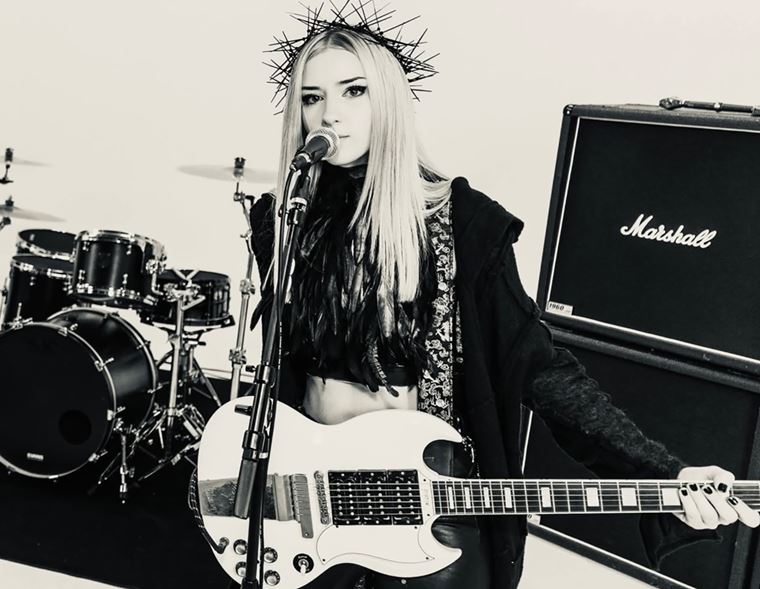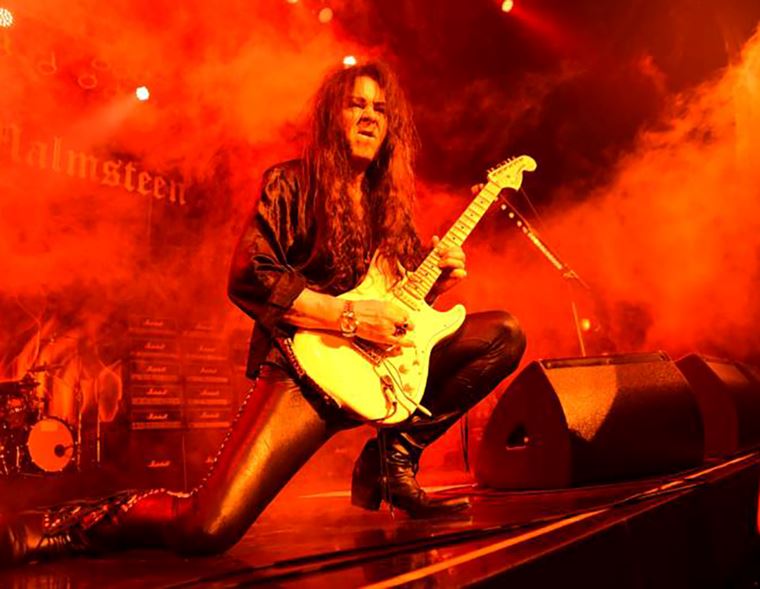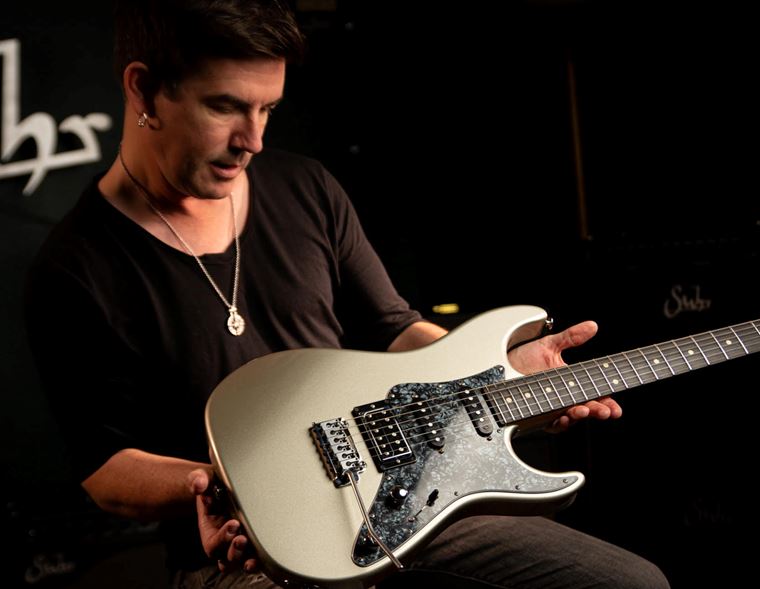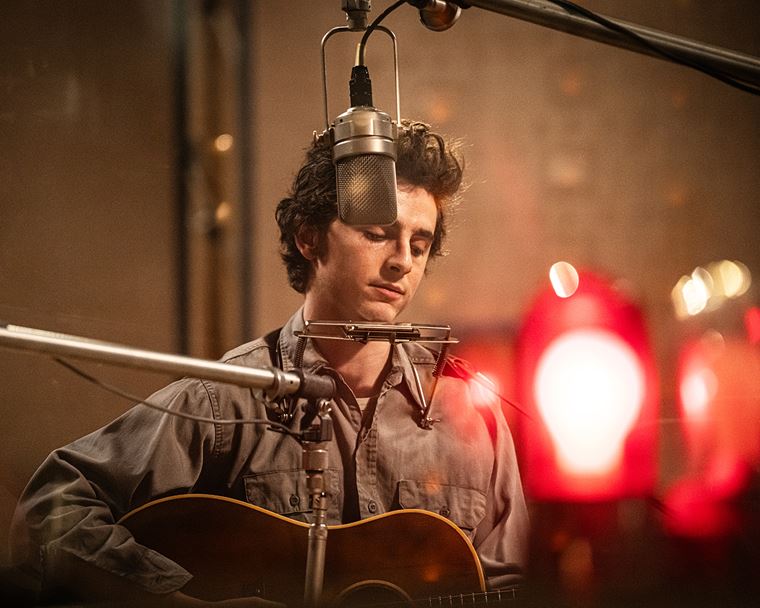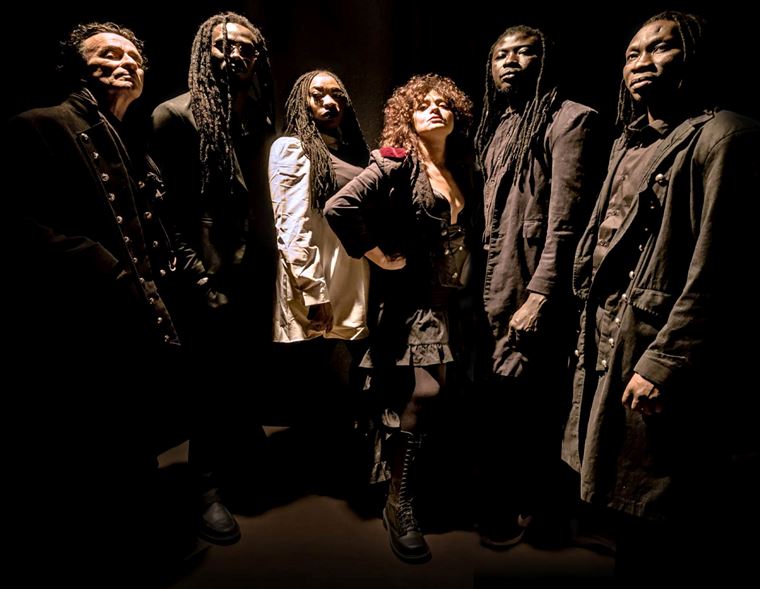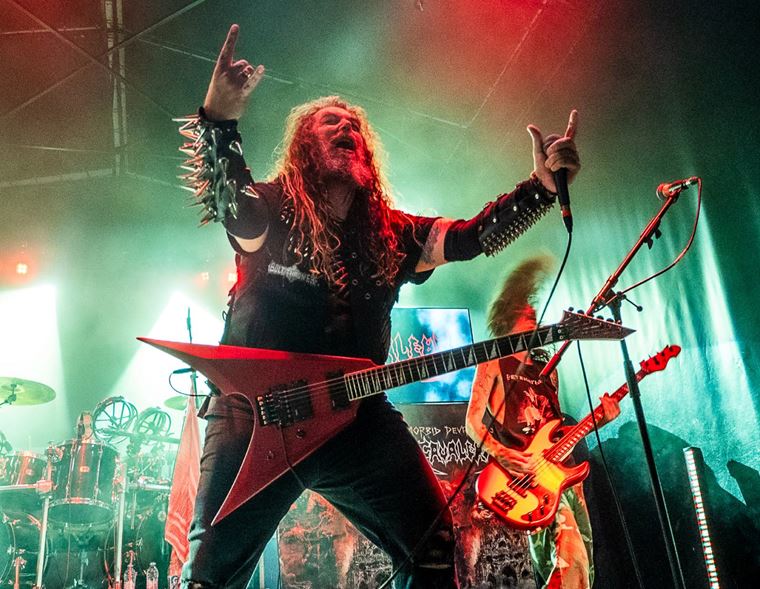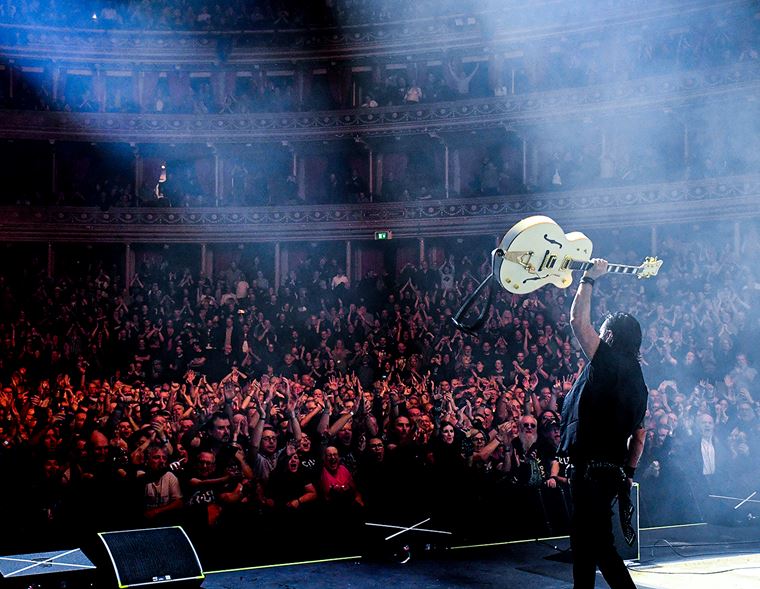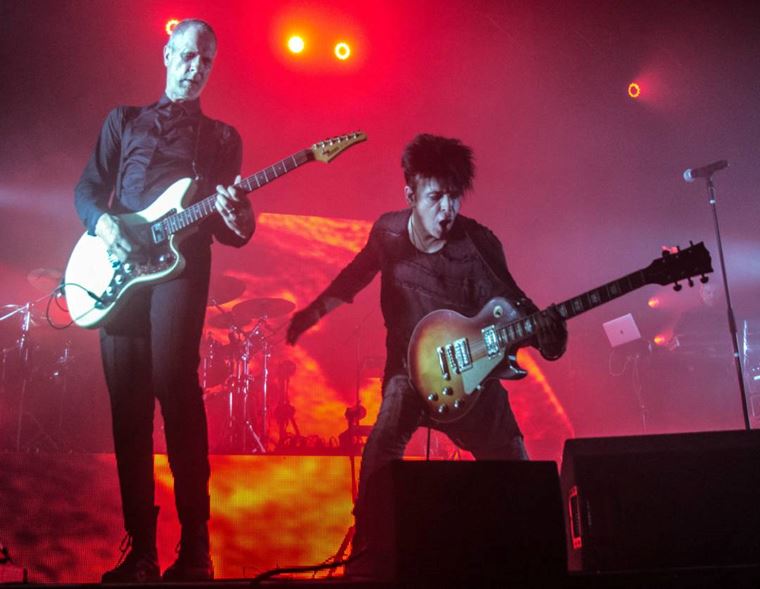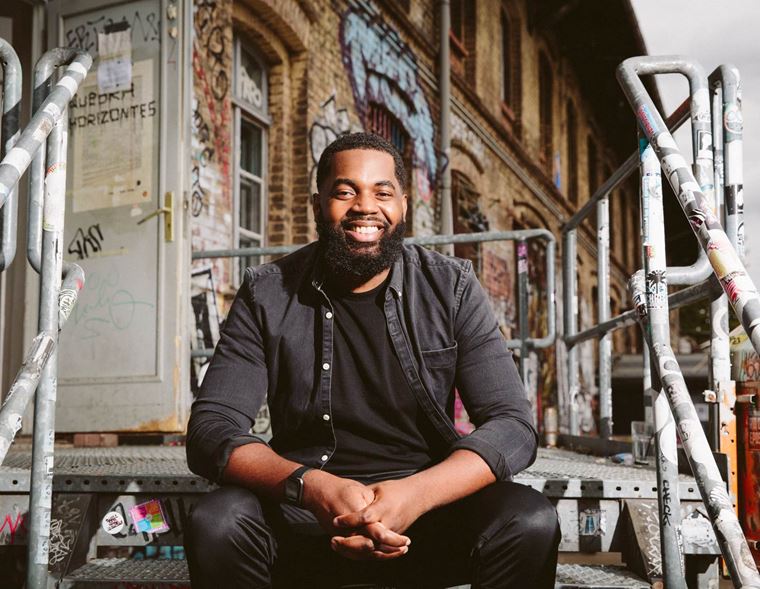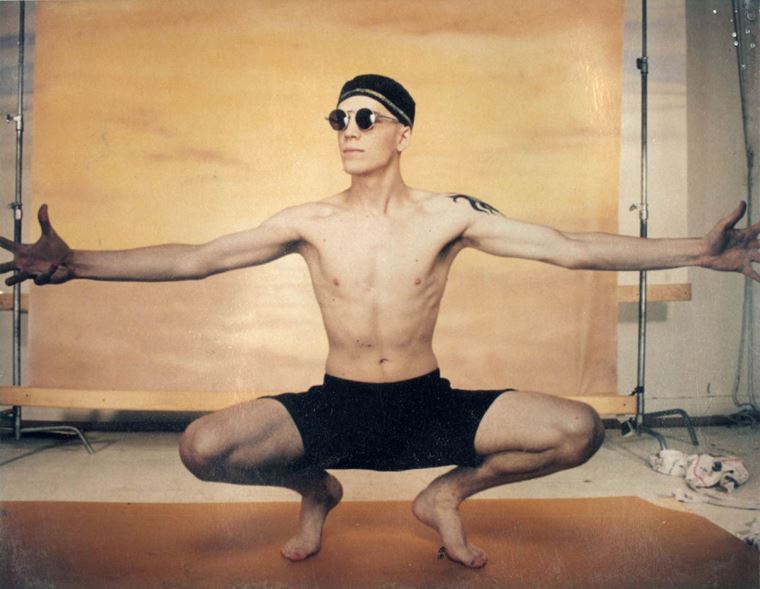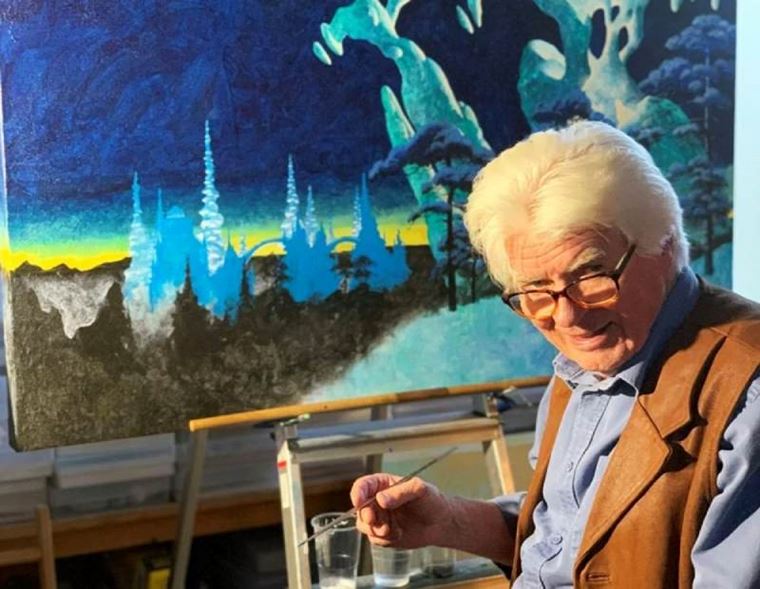The PRODIGY: Guitarist Rob Holliday Talks about Marilyn Manson, Numan, NIN & MORE!
Published on 15 March 2024
The Prodigy - one of the most massive and successful electronic/punk bands ever.
Gary Numan - the godfather of electronic rock music.
Marilyn Manson - the controversial dark lord of industrial glam.
The Creatures - featuring goth goddess Siouxsie Soux.
The Mission - shadowy goth rocker legends.
Curve - ahead of their time electro-rock.
These are just some of the gigs that guitarist Rob Holliday has been involved with over his particularly envious career. As well as all of that, he’s also got his own brutally savage industrial rock band Sulpher as well, who have two records out and another on the way.
By anyone’s standards, that’s quite the CV!
I connected with Rob whilst The Prodigy were on tour as part of their huge arena tour recently. I managed to sneak in a quick Q&A, and his guitar tech Richard was kind enough to shoot some excellent - and quite exclusive - snaps of Rob’s equipment. Whilst The Prodigy’s sound is a highly volatile mix of synths, drum machines and live musicians, you’ll see that Rob takes his full armoury of Gibsons, ESPs and Laney Ironheart amps with him on tour. It’s a matter of fighting fire with fire, and bringing that iconic band’s truly huge sound to the masses in style.
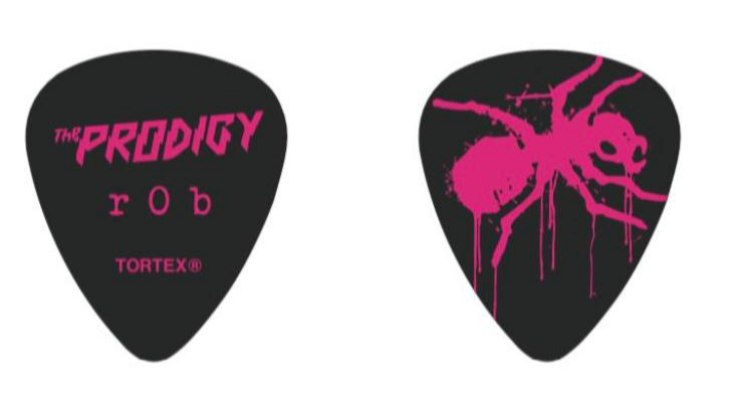
(Photo: Rob Holliday, used with permission)
In this brief but insightful interview, Rob shares his story, which is star-studded and full of insights.
Contents
Always Outnumbered, Never Outgunned: Rob’s Guitar Rig
Early Days, Gary Numan
Guitarguitar: You’ve had quite a few high profile gigs over the years! The earliest one I know of is with Gary Numan, but before that, what was your career in music like?
Rob Holliday: My parents emigrated to Canada when I was 12 so my teenage years and some of my 20s were spent over there. I started playing live in clubs and bars at the age of 16 - various cover bands and a few original acts, then I moved back to the UK and continued pursuing music.
GG: And what then led to the Numan gig?
RH: In 1998/99, I had been playing in the British band Curve (featuring Toni Halliday & Dean Garcia) and also The Creatures, which featured Siouxsie Sioux & Budgie from Siouxsie & The Banshees. Monti was also drumming in Curve and we later formed Sulpher in 2000, and had our debut album Spray out in 2001.
I was at a party at Siobhan Fahey from Bananarama’s place with Toni from Curve and Gary was there. Everyone was just hanging out and chatting. I got introduced to Gary at some point during the evening. We chatted about interests and just general this, that and the other. Then Toni mentioned that Gary should hear the Sulpher material, so I think we went out to the car and I blasted some of the album. He loved it and asked us to co-produce and do the majority of the instrumentation on his Pure album. I later made a couple of guest appearances at his live shows then he asked me to join the band which was cool. I did that for a number of years.
GG: So, you recorded with Gary as well as performing on tour. Is Gary specific about dictating what he wants/needs, or is he looking for your ideas and input?
RH: He kind of had rough vocals and a rough song layout but pretty much gave us free reign.
GG: Sonically, are many of those parts DI’d? The tone is savage!
RH: If you’re talking about the guitar tones, they were all done through a line 6 POD and rack mounted Marshall JMP-1. They have a ton of other effects on them once they’re recorded, so none of the guitar sounds are just stock. So yeah, the more savage the better, really, is my motto!
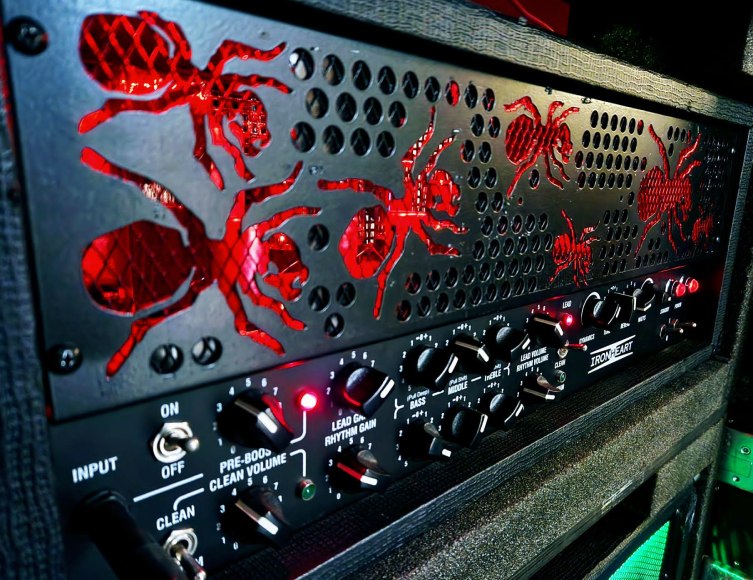
(Photo: Rob Holliday, used with permission)
Marilyn Manson
GG: One of your most well known jobs was with Marilyn Manson, on both bass and guitar. Did that lead on from playing with Gary? How was your time with MM, and was touring with him as crazy as the Long Hard Road Out of Hell book suggests?
RH: I had met Manson and his manager a few times over the years. At this point I had already been in the prodigy for around 18 months and before that Keith Flint’s side project FLINT, plus playing with Siouxsie, The Mission and Numan. I had also been over in New Orleans auditioning with Trent and Nine Inch Nails in 2004, and it's all connected in a weird way I guess!
Sulpher had also supported Manson in Germany years before at one show and then myself and his manager kept in touch. I had emailed him to see if he was going to be over in the summer of 2007 and he said yeah. Manson’s new album, Eat Me Drink Me, was pretty much done but they didn’t have a bass player yet. Five days later I was on a flight to LA and hammering through around 15 of the old Manson tracks in a studio with just myself, Ginger Fish on drums and Tim Skold on guitar. Went to hang out with Manson after the rehearsal at his place and heard the whole Eat Me Drink Me album which sounded killer!
Next morning I got the call saying ‘you’re in’. So that was that: I was the new bass player in Marilyn Manson from 2007 until 2008, and yeah, as you can imagine it's a pretty chaotic frantic travelling circus of total mayhem!
GG: He’s obviously quite a controversial character: how did you find him to work with/for?
RH: He was great, no problems at all. A class act: a superb front man - a true rockstar and there’s not many real ones left. We’ve been good friends ever since.
GG: With MM, you played both guitar and bass (as you do with the Prodigy). Is that a nice palette cleanser for you, mid-gig, or would you prefer to just stay on guitar?
RH: With Manson, I swapped halfway through the tour as Tim Skold was let go and Manson wanted to bring original bassist and songwriter Twiggy Ramirez (Jeordie White) back in so he asked me to play guitar.
With Prodigy it's mainly guitar, with a couple of songs on the bass - I’m cool and down to do whatever onstage man!
GG: You mentioned to me before about your experience with Nine Inch Nails, and how you’ve almost been a member on a number of occasions. Could you tell us that story?
RH: Just through the circles im involved in, Trent had me over a few times over a number of years. Robin Finck had returned at one point and then Trent went with Aaron North on another occasion.
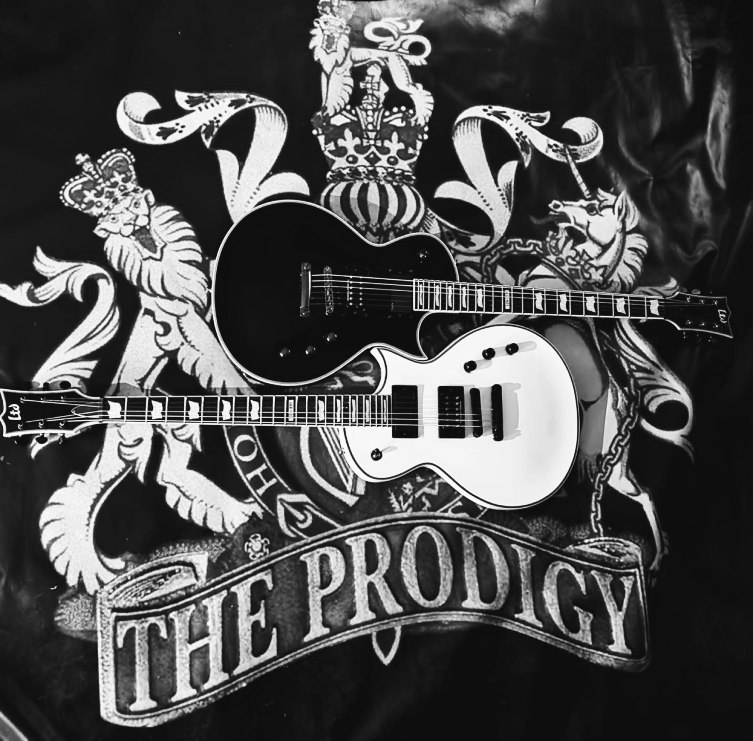
(Photo: Rob Holliday, used with permission)
The PRODIGY
GG: You’ve been with the Prodigy since 2015, is that right? How did the Prodigy gig come about?
RH: I’ll have to correct you there: I’ve been in the prodigy since 2005! I left to play with Manson in 2007 and then immediately returned to the Prodigy in May 2008.
GG: In the Prodigy, lots of the music on the record is synths and samples. For live guitar work, do you have relatively free reign about what you play, when you aren’t playing guitar riffs like Their Law or Serial Thrilla?
RH: I mean, yeah, pretty much! Liam will kind of either want specific riffs or guitar type sounds from the albums or, ya know, if you throw something cool at him and he likes it then he will be down for me doing whatever. He has the final say obviously. If he doesn’t like something he will let you know!
GG: Is there such a thing as a ‘rehearsal’ for the Prodigy, prior to touring? Does Liam improvise much with his equipment? If so, do you as a band have a system for handling that?
RH: Liam’s the boss. He’s got a shit ton of gear up there to play around with and he’s going off back there with crazy fuckin sounds. And yeah, myself and Leo will go in for a few days with our techs, make sure everything is ready to go then we go in as a full band for a number of days. Then there’s normally a couple of full production rehearsals with full stage sound and lights. It’s a huge production!
GG: Losing Keith must have been a horrendous shock for everyone. Was the decision to carry on after him tough? He must’ve occupied such a space in the band: him being gone must’ve been devastating.
RH: Yeah, I mean that was a real fucked up time and situation. I think it just totally blew everyone’s minds - everyone was overcome with sadness and in general wondering what the hell had just happened. No one really knew at the time if the Prodigy would carry on.
I mean, Keith and his stage presence are irreplaceable, it’s just as simple as that. But, I think the Prodigy fans and Keith would want the band to continue. There was a lot of talk and discussion, and Liam and Maxim were like, ‘lets go, we gotta continue’. And I for one am honoured to be a part of it, then and now.
GG: I see you’re a big fan of singlecut guitars like Les Pauls and ESP Eclipses. What is it about those guitars you love so much?
RH: Ahh man, I’ve been playing Gibson Les Pauls for like 35 years now. And when I got in touch with ESP about an endorsement, I saw those guitars and man, they are sick! So that all worked out with them and they’ve been super badass with me for over 15 years now.
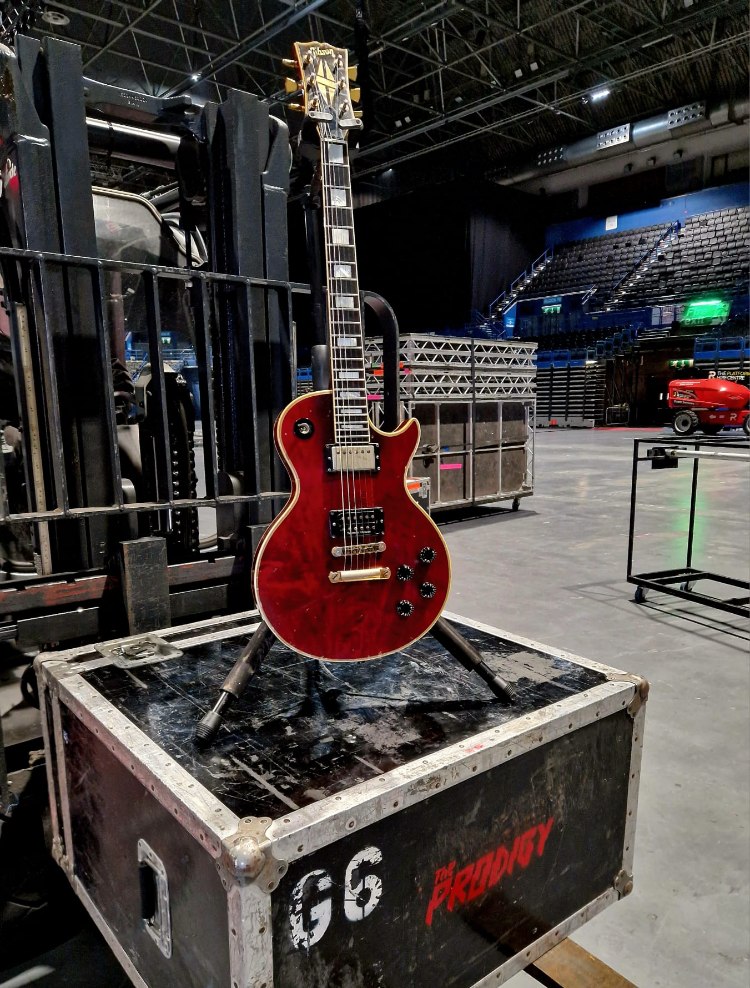
(Photo: Rob Holliday, used with permission)
GG: Do you utilise non-standard tunings at all?
RH: Yeah, I'm usually drop D for all. Thing is, a lot of the old Prodigy tracks aren’t tuned to normal 440 tuning, so the guitar tunings are up and down all over the place! Rich, my tech, handles all the tunings and he’s superb, couldn’t do it without him.
GG: Would you say that you’re something of a ‘sci-fi’ guitarist, given the bands you’ve been in?
RH: Sci-fi? Hmmm, no, not at all lol! If you think I’m sci-fi then I’ll leave it as that: sure, why not lol!
GG: Of all your high profile gigs, what is your most memorable moment?
RH: Oh man, come on! There’s so many! That’s an impossible one to answer.
GG: For your line of work, how important is making (and keeping) contacts?
RH: I guess it's pretty important. I guess every band I’ve been in happened because someone recommended me or saw me in another act.
Sulpher
GG: Amidst all of this other work, you’ve also made a splendid noise with your own band, Sulpher. Is it difficult to navigate your own band when you are so often part of something else?
RH: It’s a little difficult to kind of go from a huge arena or festival in front of 80,000 people to a small club of 300-500, that’s kind of a massive head fuck! And just the amount of touring I’ve done over the past 20 years, it’s sometimes hard to sit down and get motivated to work on Sulpher sometimes. But you know, I’ve managed to get it going a number of times and have had two albums out: Spray and No One Will Ever Know. I’m currently working on the third album Pray for Today, Tomorrow May Never Come.
GG: Is it good to have a both band where you’re a primary songwriting focus, and also work where you are less hands-on in that regard, and can focus on the art of performing?
RH: Yeah! I mean, just playing live is pretty stress free, especially with a huge production band like the Prodigy or Manson, when you have pro guys working so hard to make the show perfect and having a great guitar tech to take any stress off me completely is lovely and very much appreciated!
GG: Last one, Rob! You’re a very animated, charismatic performer on stage. What one tip can you give other guitarists to put on a better live performance?
RH: Get some good knee braces cos your knees are gonna be fucked later in life. God knows mine are!
Always Outnumbered, Never Outgunned: Rob’s Guitar Rig
Rob and his tech Richard Pratt kindly listed out Rob’s gear chain, which is both simple and complex at the same time! The info was listed out along with some great photos of the gear, produced here with kind permission from Rob.
ESP Guitars
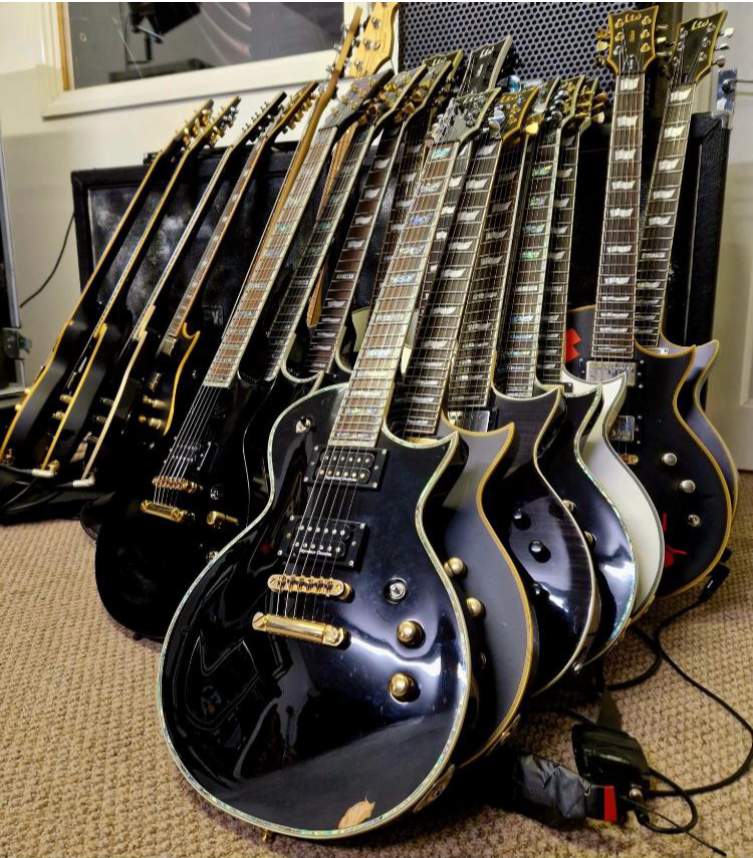
(Photo: Rob Holliday, used with permission)
"Some matt black LTD Eclipse models, some black EC 401’s"
Gibson Guitars
"I have a 1976 cherry red Gibson Les Paul custom that I’ve had for over 30 years."
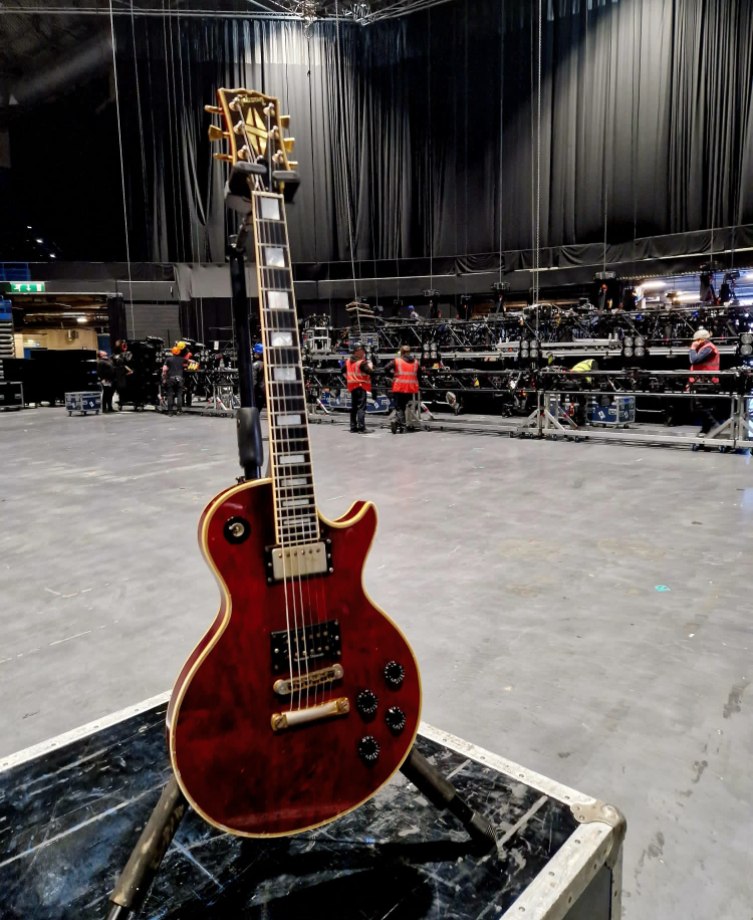
(Photo: Rob Holliday, used with permission)
"I also have a 1996 black Les Paul custom which I’ve had in my rig for around 12 years."
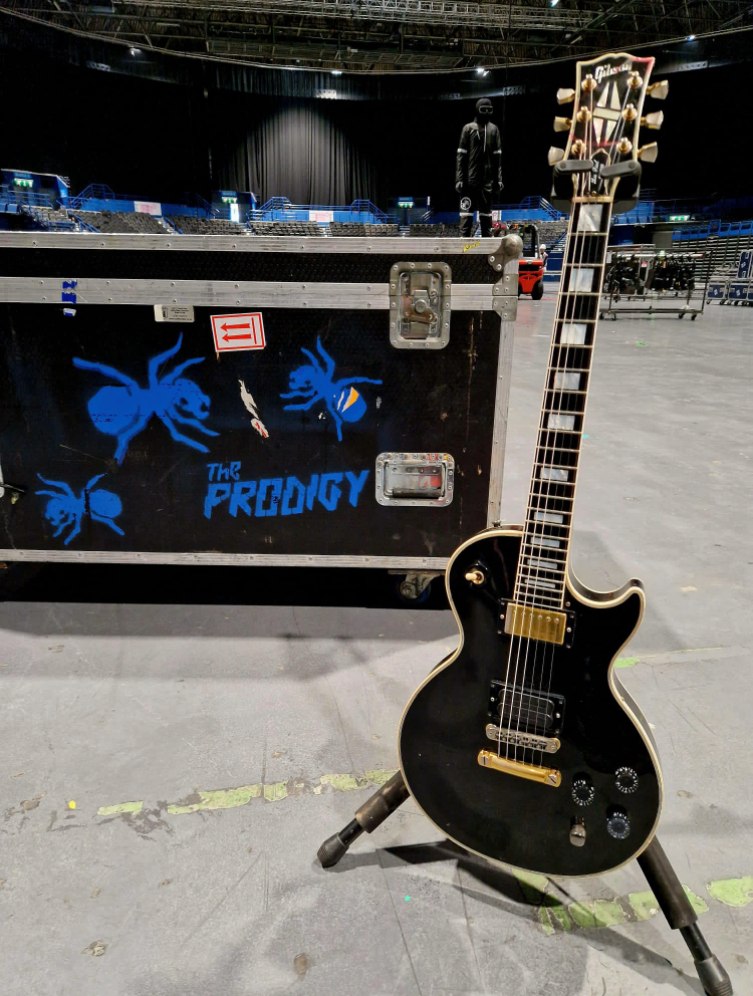
(Photo: Rob Holliday, used with permission)
"A few white ones also."
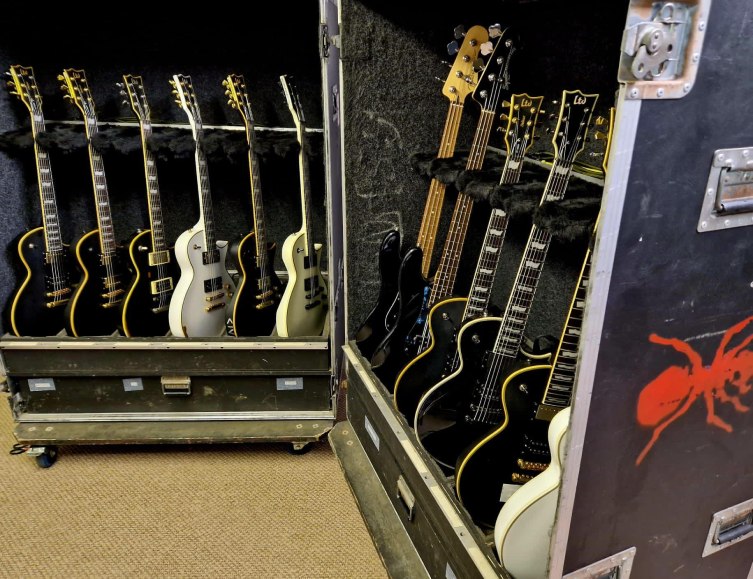
(Photo: Rob Holliday, used with permission)
Signal Chain
"The rest of the rig is comprised of Laney Ironheart heads and Laney 4x12 cabs :
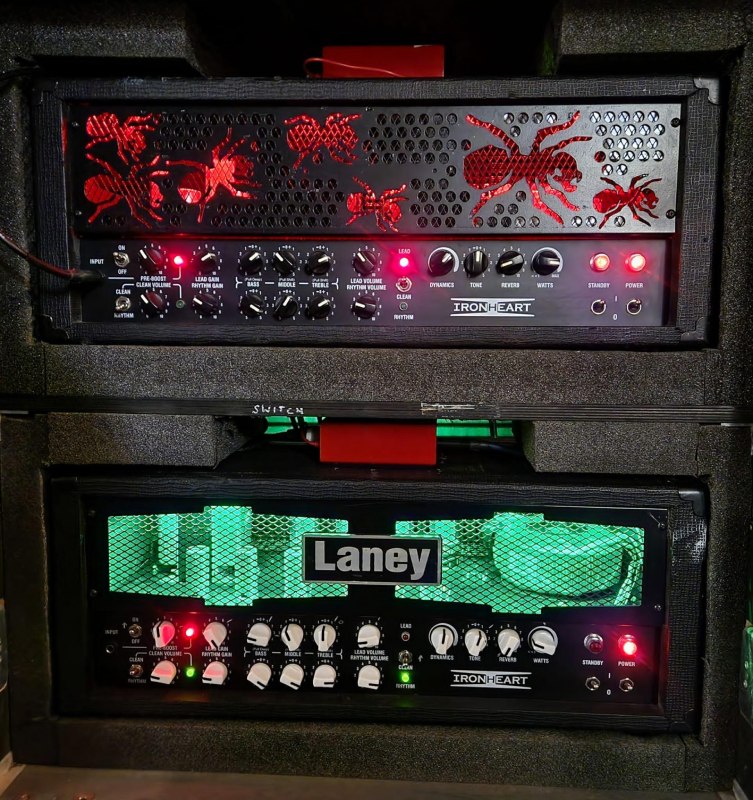
(Photo: Rob Holliday, used with permission)
Signal chain is: Sennheiser EW500 wireless system x 6 into a Radial JX62 stage control for selecting guitars.
Out of that into a Boss NS-2 for crushing electromagnetic pickup interference, a Boss DS-2 Turbo distortion, then a boss DD-20 Giga-delay pedal into the Laney head.
Then back into the NS-2's return via the amp’s post preamp effects loop to get rid of the gain amp noise when not playing.
There is a Lehle P-Split to bring the impedance up after the wireless and cut any earth hum created by having so many mains powered units in one rack.
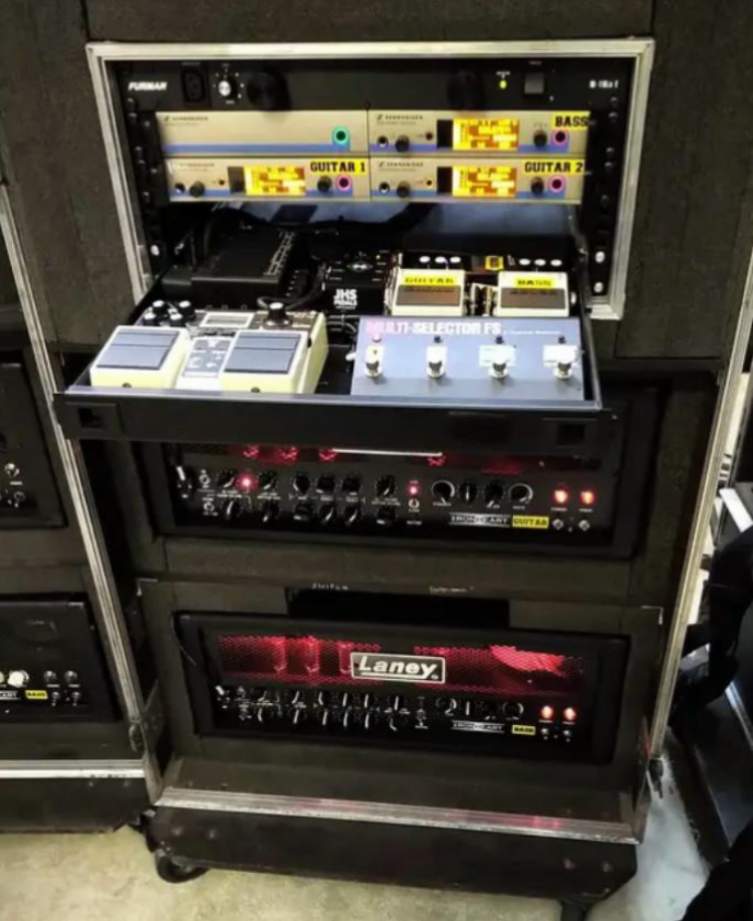
(Photo: Rob Holliday, used with permission)
The bass rig is a similar set up.
Tons of subs from Liam and the synths so the bass guitar is more of a cutting punk bass sound through separate Laney heads but I just use a multi selector to flip between the two basses."
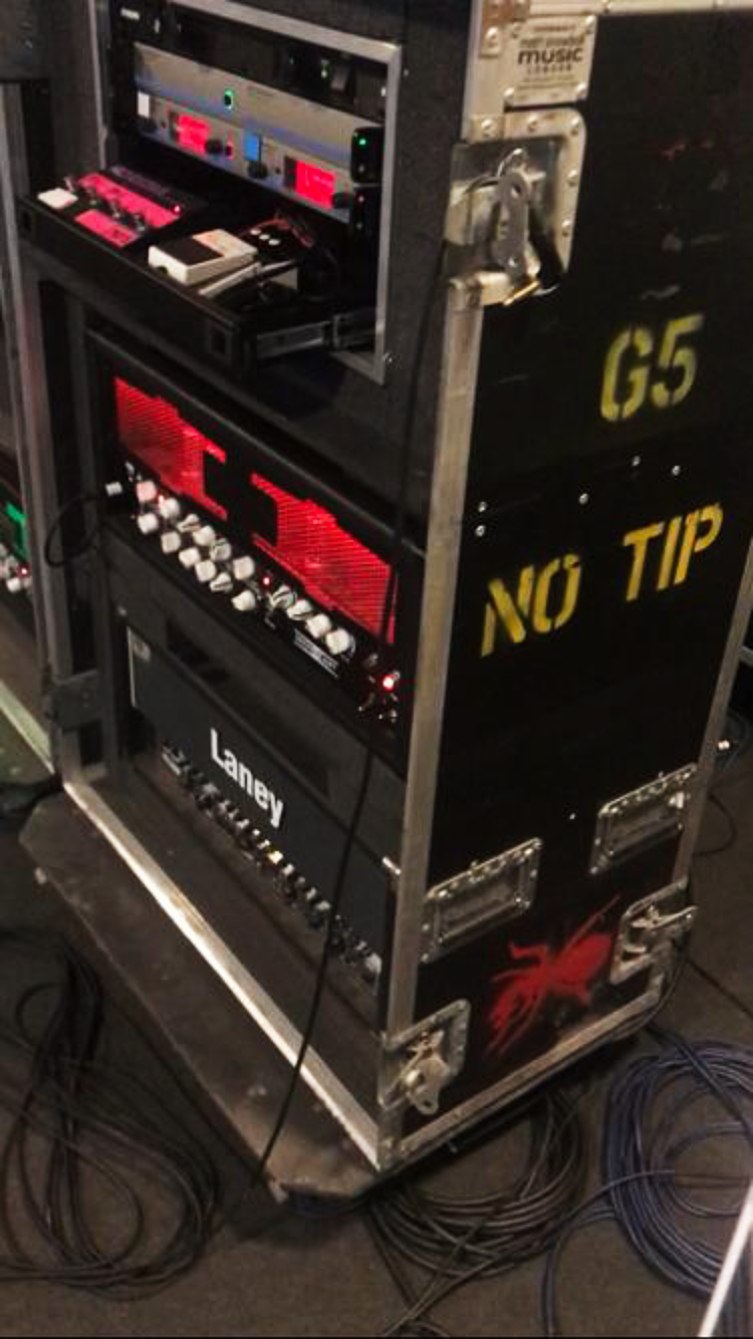
(Photo: Rob Holliday, used with permission)
The Poison and the Remedy
So there you have it! Rob’s led quite a career so far, and is showing no signs of slowing down! The Prodigy’s tour is over for the moment, but the band are headlining several festivals over the summer, including the Isle of Wight, Reading & Leeds and Hellfest. I shudder for any poor bands having to share the stage with these guys: they just can’t be beaten right now for energy, vibe and sheer sound!
Head over to the official Prodigy website for tour dates, merch and all the rest. Also check out the Sulpher's Instgram for more on Rob’s band.
I’d like to thank Rob for his great attitude & accessibility, and to Richard Pratt for his photos and info!
Thanks for reading another exclusive guitarguitar interview! If you liked this one, we have over 150 more on the guitarguitar interviews page: I personally recommend Prodigy/Rob Holliday fans check out our interviews with Robin Finck, Steve Harris, Filter and Ministry!


